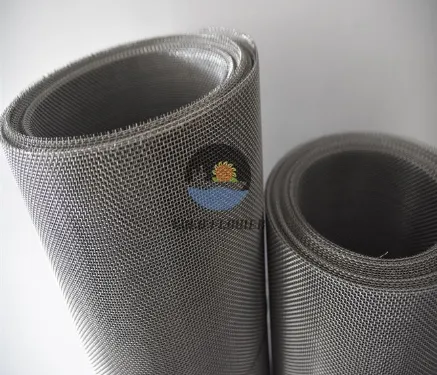Jun . 09, 2025 10:44 Back to list
Key Considerations for Specialized Wire Mesh Solutions
In industrial, agricultural, and residential settings, the selection of wire mesh hinges on specific requirements for strength, corrosion resistance, and functionality. Keywords such as stainless steel wire mesh 3mm, 3mm galvanised wire mesh, 316l stainless steel wire mesh, 316l stainless steel mesh, and stainless steel garden mesh represent specialized options designed for diverse applications. Understanding their features, uses, and performance nuances is essential for making informed decisions.

Properties and Applications of Stainless Steel Wire Mesh 3mm
Stainless steel wire mesh 3mm is valued for its balance of durability and versatility. With a 3mm wire diameter, this mesh offers moderate strength suitable for applications like industrial screening, machine guards, or architectural partitions. The stainless steel construction provides resistance to rust and chemical exposure, making it ideal for outdoor or harsh environments. For example, in food processing facilities, stainless steel wire mesh 3mm can be used to separate components in conveyor systems while adhering to hygiene standards. Its open structure allows for optimal airflow and visibility, ensuring practicality without compromising on security.
The Utility of 3mm Galvanised Wire Mesh
3mm galvanised wire mesh stands out for its cost - effective corrosion protection. The galvanised coating—typically zinc—shields the steel from rust, making it a popular choice for agricultural fencing, garden barriers, or storage shelving. The 3mm wire thickness provides robustness for containing livestock or securing perimeters, while the mesh size (varies by design) can be tailored to prevent small animal intrusions. In construction, 3mm galvanised wire mesh is often used as formwork reinforcement or plaster mesh, leveraging its strength and resistance to moisture in concrete applications.
Advantages of 316L Stainless Steel Wire Mesh and Mesh
316l stainless steel wire mesh and 316l stainless steel mesh are premium options engineered for extreme environments. The 316L grade, with added molybdenum, offers superior resistance to chloride corrosion, making it indispensable in marine, chemical, or coastal settings. These meshes are commonly used in saltwater filtration systems, offshore platforms, or pharmaceutical equipment where exposure to harsh chemicals or saline conditions would degrade standard grades. The fine weave options of 316l stainless steel mesh also make it suitable for precision applications like laboratory sieving or air purification, where particle retention and structural integrity are critical.
Enhancing Outdoor Spaces with Stainless Steel Garden Mesh
Stainless steel garden mesh combines functionality with aesthetic appeal for residential and commercial landscapes. Its corrosion - resistant properties make it ideal for garden edging, plant supports, or decorative screens that withstand weathering without rusting. The sleek appearance of stainless steel complements modern garden designs, while the mesh structure allows for plant growth and airflow. For example, stainless steel garden mesh can be used as a trellis for climbing vines or as a protective barrier around vegetable gardens to deter pests like rabbits or rodents, all while maintaining a clean, minimalist look.
FAQ: Navigating Specialized Wire Mesh Choices
How to Select Between Stainless Steel and Galvanised Wire Mesh?
Choose stainless steel wire mesh (e.g., 316L or 3mm grades) for high - corrosion environments like coastal areas or chemical plants, where longevity and resistance to harsh elements are critical. Opt for 3mm galvanised wire mesh for cost - sensitive applications with moderate corrosion risk, such as garden fencing or general - purpose screening. Consider factors like budget, environmental exposure, and required load - bearing capacity to determine the best fit.
What Are the Key Differences Between 316L and Other Stainless Steel Grades?
316L stainless steel mesh offers enhanced resistance to chloride - induced corrosion compared to 304 grade, thanks to its molybdenum content (2–3%). This makes it suitable for marine, saltwater, or industrial settings with high chemical exposure. While 316L is more expensive, its durability justifies the investment in critical applications, whereas 304 grade is adequate for most general - use scenarios.
Can 3mm Galvanised Wire Mesh Be Used for Heavy - Duty Applications?
3mm galvanised wire mesh is suitable for moderate - duty tasks like livestock fencing or garden barriers but may not withstand extreme loads or impacts. For heavy - duty industrial uses, such as machinery guarding or structural reinforcement, consider thicker wire gauges or stainless steel options like stainless steel wire mesh 3mm, which offer higher tensile strength and resistance to deformation.
How to Maintain Stainless Steel Garden Mesh for Longevity?
Regularly clean stainless steel garden mesh with a soft brush and mild detergent to remove dirt or mineral deposits, especially in areas with hard water. Avoid using abrasive cleaners or steel wool, which can scratch the surface and compromise corrosion resistance. Inspect for loose wires or damage after extreme weather events and repair promptly to maintain structural integrity.
What Factors Influence the Cost of 316L Stainless Steel Wire Mesh?
Costs for 316l stainless steel wire mesh are influenced by wire diameter, mesh density, weave type, and order volume. Finer weaves and thinner wires (e.g., for precision filtration) increase manufacturing complexity, while bulk orders often qualify for discounts. The premium for 316L grade stems from its specialized alloy composition, making it more expensive than galvanised or standard stainless steel meshes but essential for high - risk environments.
share
-
What Are the Key Applications and Benefits of Chicken Wire Gabion and Related Retaining Solutions?
NewsJul.18,2025
-
What Are the Key Advantages and Applications of PVC Coated Gabion Wire Mesh and Related Solutions?
NewsJul.18,2025
-
Welded Gabion Mesh Solutions: Strength and Versatility in Construction
NewsJul.18,2025
-
Essential Solutions for Slope Stability: A Focus on Protective Nets
NewsJul.18,2025
-
Durable Solutions for Erosion Control and Construction: Galvanised Gabion Systems
NewsJul.18,2025
-
Constructing Functional Structures: The Art of Making Gabions
NewsJul.18,2025

